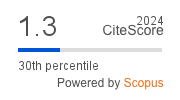Analysis of anti-Streptococcus sanguinis IgY ability to inhibit Streptococcus sanguinis adherence
Downloads
Downloads
Kreth J, Merritt J, Qi F. Bacterial and host interactions of oral streptococci. DNA Cell Biol. 2009; 28(8): 397–403.
Okahashi N, Nakata M, Sakurai A, Terao Y, Hoshino T, Yamaguchi M, Isoda R, Sumitomo T, Nakano K, Kawabata S, Ooshima T. Pili of oral Streptococcus sanguinis bind to fibronectin and contribute to cell adhesion. Biochem Biophys Res Commun. 2010; 391(2): 1192–6.
Díaz PI, Kolenbrander PE. Subgingival biofilm communities in health and disease. Rev Clínica Periodoncia, Implantol Rehabil Oral. 2009; 2(3): 187–92.
Westling K. Viridans group Streptococci septicaemia and endocarditis. Thesis. Stockholm: Karolinska Institutet; 2005. p. 9-31.
Ekdahl C. Infective endocarditis – aspects of pathophysiology, epidemiology, management and prognosis. Thesis. Linköping: Linköping University; 2008. p. 7-36.
Lockhart PB, Brennan MT, Sasser HC, Fox PC, Paster BJ, Bahrani-Mougeot FK. Bacteremia associated with toothbrushing and dental extraction. Circulation. 2008; 117(24): 3118–25.
Masuda K, Nemoto H, Nakano K, Naka S, Nomura R, Ooshima T. Amoxicillin-resistant oral streptococci identified in dental plaque specimens from healthy Japanese adults. J Cardiol. 2012; 59(3): 285–90.
Sahasrabhojane P, Galloway-Peña J, Velazquez L, Saldaña M, Horstmann N, Tarrand J, Shelburne SA. Species-level assessment of the molecular basis of fluoroquinolone resistance among viridans group streptococci causing bacteraemia in cancer patients. Int J Antimicrob Agents. 2014; 43(6): 558–62.
Wen J, Zhao S, He D, Yang Y, Li Y, Zhu S. Preparation and characterization of egg yolk immunoglobulin Y specific to influenza B virus. Antiviral Res. 2012; 93(1): 154–9.
Xu Y, Li X, Jin L, Zhen Y, Lu Y, Li S, You J, Wang L. Application of chicken egg yolk immunoglobulins in the control of terrestrial and aquatic animal diseases: a review. Biotechnol Adv. 2011; 29(6): 860–8.
Chalghoumi R, Beckers Y, Portetelle D, Théwis A. Hen egg yolk antibodies (IgY), production and use for passive immunization against bacterial enteric infections in chicken: a review. Biotechnol Agron Soc Env. 2009; 13(2): 295–308.
Vanessa B, Virginie M, Nathalie Q, Marie-Hélène R, Christine I. Hartmannella vermiformis can promote proliferation of Candida spp. in tap-water. Water Res. 2012; 46(17): 5707–14.
Siswomihardjo W, Sunarintyas S, Tontowi AE. The effect of zirconia in hydroxyapatite on Staphylococcus epidermidis growth. Int J Biomater. 2012; 2012: 1–4.
Johansen T, Agdestein A, Olsen I, Nilsen S, Holstad G, Djí¸nne B. Biofilm formation by Mycobacterium avium isolates originating from humans, swine and birds. BMC Microbiol. 2009; 9: 159.
Raja AF, Ali F, Khan IA, Shawl AS, Arora DS. Acetyl-11-keto-β-boswellic acid (AKBA); targeting oral cavity pathogens. BMC Res Notes. 2011; 4: 406.
Setiawati S, Nuryastuti T, Ngatidjan N, Mustofa M, Jumina J, Fitriastuti D. In vitro antifungal activity of (1)-N-2-Methoxybenzyl-1, 10-phenanthrolinium Bromide against Candida albicans and its effects on membrane integrity. Mycobiology. 2017; 45: 25–30.
Fujibayashi T, Nakamura M, Tominaga A, Satoh N, Kawarai T, Narisawa N, Shinozuka O, Watanabe H, Yamazaki T, Senpuku H. Effects of IgY against Candida albicans and Candida spp. adherence and biofilm formation. Jpn J Infect Dis. 2009; 62(5): 337–42.
Brezski RJ, Jordan RE. Cleavage of IgGs by proteases associated with invasive diseases: an evasion tactic against host immunity? MAbs. 2010; 2(3): 212–20.
Amerongen AN, Verman ECI, Abyono R. Ludah dan kelenjar ludah: arti bagi kesehatan gigi. Yogyakarta: Gadjah Mada University Press; 1991. p. 269.
Huang R, Li M, Gregory RL. Bacterial interactions in dental biofilm. Virulence. 2011; 2(5): 435–44.
Jakubovics NS. Intermicrobial interactions as a driver for community composition and stratification of oral biofilms. J Mol Biol. 2015; 427(23): 3662–75.
- Every manuscript submitted to must observe the policy and terms set by the Dental Journal (Majalah Kedokteran Gigi).
- Publication rights to manuscript content published by the Dental Journal (Majalah Kedokteran Gigi) is owned by the journal with the consent and approval of the author(s) concerned.
- Full texts of electronically published manuscripts can be accessed free of charge and used according to the license shown below.
- The Dental Journal (Majalah Kedokteran Gigi) is licensed under a Creative Commons Attribution-ShareAlike 4.0 International License

















